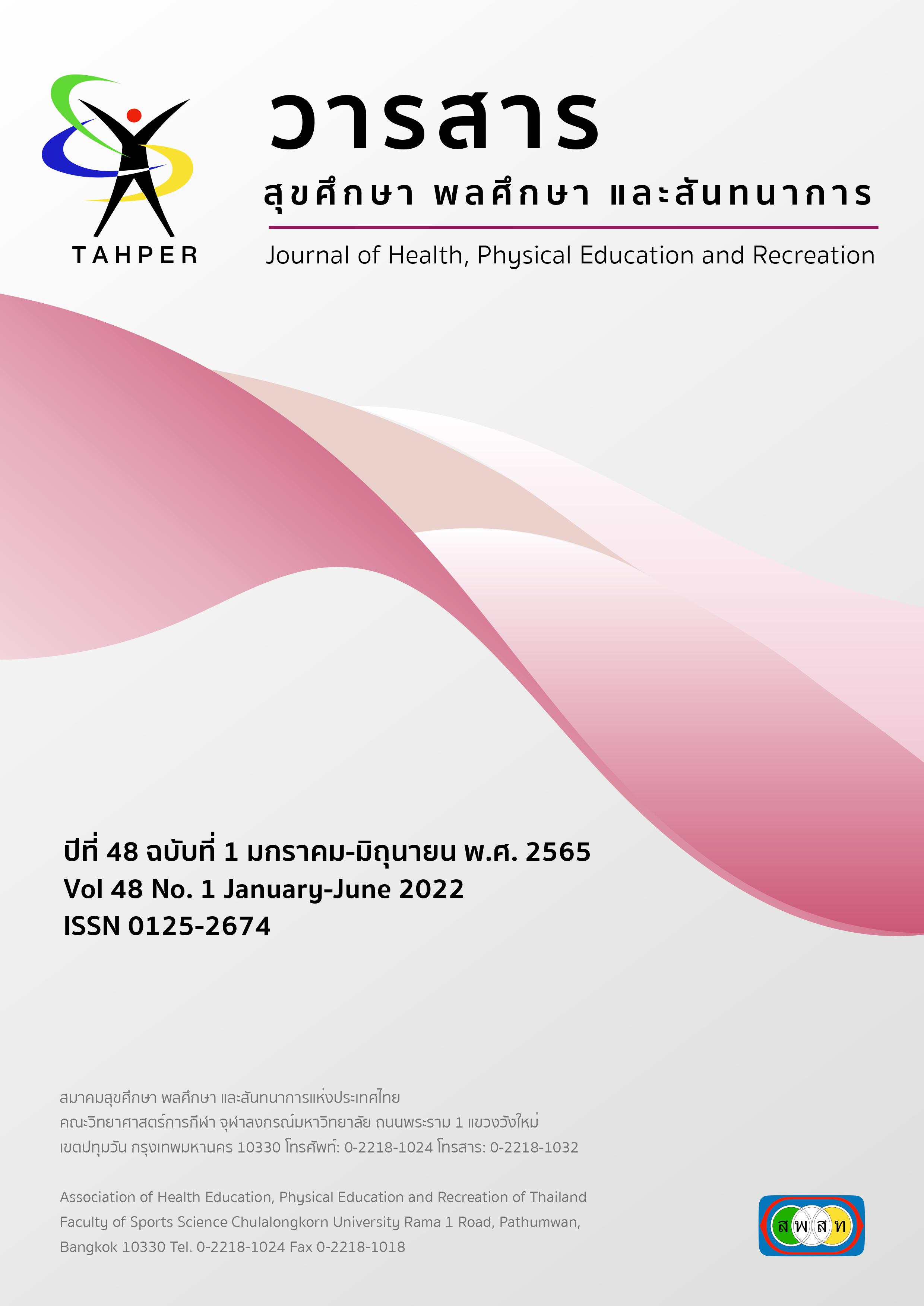ผลของการใช้การละเล่นพื้นบ้านไทยด้วยเทคนิคกลุ่มแข่งขันที่มีต่อทักษะชีวิต การเรียนรู้ทางกลไก และสมรรถภาพทางกลไก ของนักเรียนประถมศึกษาตอนต้น Effects of Thai Folk Game Using Team Game Tournament Cooperative Learning on Life Skill Motor Learning and Motor Fitness for Primary School Student
Main Article Content
Abstract
บทคัดย่อ
การวิจัยครั้งนี้มี วัตถุประสงค์ เพื่อศึกษาและเปรียบเทียบผลของการใช้การละเล่นพื้นบ้านไทยด้วยเทคนิคกลุ่มแข่งขันที่มีต่อทักษะชีวิต การเรียนรู้ทางกลไก และสมรรถภาพทางกลไก ระหว่างกลุ่มทดลองและกลุ่มควบคุม ของนักเรียนระดับประถมศึกษาตอนต้น อายุระหว่าง 7-9 ปี ทั้งเพศชายและเพศหญิง โดยการอาสาสมัครเข้าร่วม จำนวน 40 คน แบ่งกลุ่มโดยการจับฉลากเข้ากลุ่มทดลองและกลุ่มควบคุม กลุ่มละ 20 คน ซึ่งทำการทดลองสัปดาห์ละ 3 วัน วันละ 1ชั่วโมง เป็นเวลา 8 สัปดาห์ สถิติที่ใช้ในการวิเคราะห์ข้อมูลได้แก่ ค่าเฉลี่ย ส่วนเบี่ยงเบนมาตรฐาน การทดสอบที วิเคราะห์ความแปรปรวนแบบทางเดียวชนิดวัดซ้ำและการทดสอบความแตกต่างเป็นรายคู่โดยวิธีของ บอนเฟอร์โรนี โดยกำหนดนัยสำคัญทางสถิติที่ระดับ .05
ผลการวิจัยพบว่า ในด้านทักษะชีวิต กลุ่มที่ได้รับโปรแกรมการใช้การละเล่นพื้นบ้านไทยด้วยเทคนิคกลุ่มแข่งขัน ดีกว่ากลุ่มที่เรียนปกติ (t = 6.881, p < .05) ด้านการเรียนรู้ทางกลไก กลุ่มที่ได้รับโปรแกรมการใช้การละเล่นพื้นบ้านไทยด้วยเทคนิคกลุ่มแข่งขัน สามารถกระโดด 2 ขา ข้ามเส้นยาง และ ยืนทรงตัวด้วยขาข้างเดียว ดีกว่านักเรียนที่เรียนปกติ (t = 2.373, 2.517, p < .05) และด้านสมรรถภาพทางกลไก พบว่า การนั่งงอตัวไปข้างหน้า กลุ่มที่ได้รับโปรแกรมการใช้การละเล่นพื้นบ้านไทยด้วยเทคนิคกลุ่มแข่งขัน ดีกว่ากลุ่มที่เรียนปกติ (t = 3.793, p < .05) สำหรับอีก 4 รายการ การยืนกระโดดไกล ลุกนั่ง 30 วินาที วิ่งเก็บของ วิ่ง 50 เมตร พบว่าทั้งสองกลุ่มไม่แตกต่างกัน (t = 1.160, 1.939, -0.240, -0.844, p > .05) การใช้การละเล่นพื้นบ้านไทยด้วยเทคนิคกลุ่มแข่งขัน สามารถพัฒนาทักษะชีวิต การเรียนรู้ทางกลไก สมรรถภาพทางกลไก ความอ่อนตัว ของนักเรียนระดับประถมศึกษาตอนต้น
คำสำคัญ : การเรียนรู้แบบเทคนิคกลุ่มแข่งขัน การละเล่นพื้นบ้านไทย ทักษะชีวิต การเรียนรู้ทางกลไก สมรรถภาพทางกลไก
Abstract
The purposes of this research were to study and compare the effects of Thai folk game using Team Game Tournament (TGT) cooperative learning on life skill, motor learning and motor fitness for primary school students. between experimental groups and control groups. The participants were school students aged between 7-9 years old, both males and females, by 40 volunteers to participated. divide the groups by simple random sampling into experimental and control groups, a group of 20. The experimental groups took an hour a day, 3 days a week for 8 weeks. The data were analyzed using , SD, t-test independent sample, one-way ANOVA with repeated measures and Bonferroni method at level of significance 05.
The result of the research indicated that life skill of experimental groups better than the control groups (t = 6.881, p < .05). Thai folk games using Team Game Tournament (TGT) cooperative learning, the motor learning of experimental groups (jump 2 legs across the rubber line and stork stand) was better than control groups (t = 2.373, 2.517, p < .05). For motor fitness, the researchers found that sit and reach in experimental groups is better than the control groups (t = 3.793, p < .05), except standing long jump, 30 seconds sit -up, shuttle run, and sprint 50m, that both groups were not different (t = 1.160, 1.939, -0.240, -0.844, p > .05). In conclusion, Thai folk games using technical Team Game Tournament (TGT) cooperative learning can be employed to help develop life skill, motor learning and flexibility for primary school students.
Keywords: Team Game Tournament (TGT) Cooperative learning, Thai folk games,
life skills, motor learning, motor fitness
Article Details
Critical thinking in journals is the right of the author. The Association of Health Education, Physical Education and Recreation of Thailand is not always required, to create diversity in ideas and creativity.
ความคิด ข้อวิพากษ์ในวารสารเป้นสิทธิของผู้เขียน สมาคมสุขศึกษา พลศึกษา และสันทนาการแห่งประเทศไทยไม่จำเป็นต้องเห็นชอบด้วยเสมอไป เพื่อให้เกิดความหลากหลายในความคิดและความสร้างสรรค์


